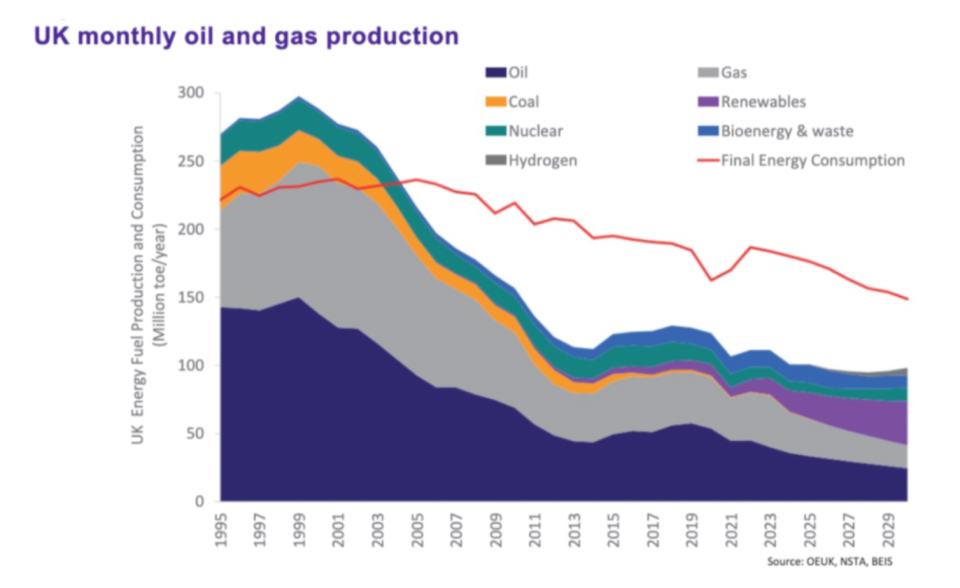Starmer tells Davos Labour would ban oil and gas projects, as critics say it jeopardises net zero and energy security

Labour risks undermining the UK’s energy security and environmental goals by calling for no further investment new oil and gas projects in the North Sea as revealed at Davos, warned industry body Offshore Energies UK (OEUK).
The association’s external relations director Jenny Stanning argued that “words have consequences,” and that Labour risked “undermining investor confidence.”
She believed the UK will still “need gas and oil” for decades to come, and that domestic fossil fuel operators were essential for investing in the transition to net zero.
Stanning said: “They are already building the offshore wind farms, the CO2 capture and storage systems and the hydrogen production facilities that will power our country in future. Labour has acknowledged that it can only deliver this in partnership with business and our members stand ready to work together to achieve this.
This follows leader of the opposition, Keir Starmer, revealing there would be no investment in the UK under a Labour government.

During a panel discussion yesterday at the World Economic Forum in Davos, Starmer explained that his party wanted to get to a new role for oil and gas in the energy transition.
He said: “What we’ve said about oil and gas is that there does need to be a transition. Obviously it will play its part during that transition but not new investment, not new fields up in the North Sea, because we need to go towards net zero, we need to ensure that renewable energy is where we go next.”
Such a move would be a sea change in the UK’s energy policy, with the Conservative government including further oil and gas exploration in the country’s supply security strategy.
The North Sea Transition Authority has just held a new licensing round for oil and gas exploration projects – which attracted over a hundred bids.
This is despite calls from the International Energy Agency for no more fossil fuel projects to keep net zero targets in check, and the emergence of a new alliance of countries at COP 27 last year committed to banning domestic oil and and gas drilling.
The next election is expected in December 2024, with Labour sustaining a large 20-point plus margin over the Tories for months.
Labour push the latest pressure on embattled North Sea industry
Currently, the UK meets around 45 per cent of its gas needs from domestic energy generation, reducing its dependence on overseas vendors with and higher emission supplies.
Despite the continued rise in renewable generation, 85 per cent of British homes still rely on gas boilers for heat and that 42 per cent of the UK’s electricity comes from gas.
OEUK has committed to reaching net zero over the next three decades, which the Office for Budget Responsibility has costed at £1.4tn over the next three decades.
This includes £1tn coming from private investors – including many OEUK members.
Stanning said: “We have an obligation to warn all policymakers that, if you undermine those companies now, and send the sector’s 200,000 skilled workers into other industries, you will damage both the nation’s current energy security and our hopes of a rapid transition to low-carbon energies,.”
Earlier this week, the UK’s largest North Sea oil and gas producer Harbour Energy confirmed plans to cut jobs after it pulled out of the latest licensing round for oil and gas projects.
This follows Chancellor Jeremy Hunt’s decision to hike the windfall tax from 25 to 35 per cent, on top of the 40 per cent special corporation tax rate.
He also brought in the Electricity Generator – a 45 per cent levy on legacy renewable generators.

The Government is hoping to harness bumper profits from soaring oil and gas prices – aiming to raise £55bn over the next six years.
This would help fund support packages for households and businesses grappling with record energy bills.
However, Stanning argued that the “damage must stop” and called for a “compromise – a pathway we can all agree on, and which is practical for the country.”
She revealed OEUK will be actively seeking those discussions with both parties.
Labour confirmed to City A.M. its intentions to stop licenses for new oil and gas projects, and that it plans to make the UK a “clean energy superpower.”
It is targeting a zero carbon electricity system by the end of the decade, which it favours to tackle climate change, boost the economy and bring down energy bills.
A party spokesperson said: “As part of the plan, Labour will manage existing oil and gas wells sustainably over the coming decades, recognising the jobs and local economic value they bring. The transition to net zero is an opportunity for industry, and a process. We won’t turn off the taps, but part of our plan is to stop licenses for new oil and gas fields.”
When approached for comment, the Government argued domestic supplies were essential to the UK’s energy independence.
A BEIS spokesperson said: “Putin’s illegal invasion of Ukraine means it is now more important than ever that we make the most of sovereign energy resources, strengthening our energy security now and into the future.
“While we are driving down demand for fossil fuels, there will continue to be ongoing demand for oil and gas over the coming years as we transition to lower carbon, more secure forms of energy generated in this country.”